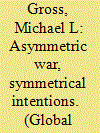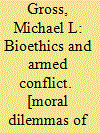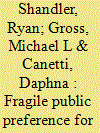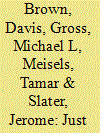|
|
|
Sort Order |
|
|
|
Items / Page
|
|
|
|
|
|
|
| Srl | Item |
| 1 |
ID:
092120


|
|
|
|
|
| Publication |
2009.
|
| Summary/Abstract |
During asymmetric war, a state actor often faces charges of disproportionate harm while the weaker, nonstate side must defend itself against charges of terrorism. Because the state actor faces an adversary embedded among civilians, and the nonstate actor confronts an opponent whose military targets are often so well protected that only its nonmilitary targets are vulnerable, it is difficult for either side to fight without harming civilians. While humanitarian law tries to protect noncombatants to the greatest extent possible, too strict an interpretation of terrorism and proportionality may unduly restrict either side's ability to pursue political claims by force of arms. To successfully walk the line between protecting civilians during asymmetric war and allowing each side a 'fighting chance', it is necessary to take another look at the idea of intentionality and the definition of combatants. While intentional harm is the hallmark of terrorism, state armies also bring intentional harm if they expect to glean military benefits from causing collateral damage to civilians. A tighter understanding of intentionality can further protect innocent, noncombatant civilians. At the same time, however, the international community must recognise that not all civilians are noncombatants. Many civilians take a direct or indirect role in the fighting. As such, some civilians are vulnerable to lethal harm while others remain subject to nonlethal harm. Asymmetric war expands the range of permissible civilian targets that each side may attack without incurring charges of terrorism or disproportionate harm.
|
|
|
|
|
|
|
|
|
|
|
|
|
|
|
|
| 2 |
ID:
073147


|
|
|
|
|
| Publication |
Cambridge, MIT Press, 2006.
|
| Description |
ix, 384p.
|
| Standard Number |
0262572265
|
|
|
|
|
|
|
|
|
|
|
|
Copies: C:1/I:0,R:0,Q:0
Circulation
| Accession# | Call# | Current Location | Status | Policy | Location |
| 051502 | 174.2/GRO 051502 | Main | On Shelf | General | |
|
|
|
|
| 3 |
ID:
177755


|
|
|
|
|
| Summary/Abstract |
To what extent does the public support the use of cyber weapons? We propose that public exposure to the destructive potential of cyber-attacks will dispel the clear cross-national preference for cyber strikes. To test this, we conducted two survey experiments (n = 2,585) that examine support for cyber versus conventional military strikes in the United States, United Kingdom, and Israel. In study 1, we exposed respondents to television news reports depicting various forms of terror attacks, and then measured the subsequent support for retaliatory options. Findings indicate that the high public support for deploying cyber weapons dissipated entirely among respondents exposed to lethal cyber-attacks. In study 2, we probed this vanishing support, finding that exposure to destructive cyber-attacks undercuts the perception of cyber as a less lethal domain, therefore diminishing its appeal. We conclude by discussing how the fragile public preference for cyber weapons encourages military escalation in the short-term.
|
|
|
|
|
|
|
|
|
|
|
|
|
|
|
|
| 4 |
ID:
122089


|
|
|
|
|
|
|
|